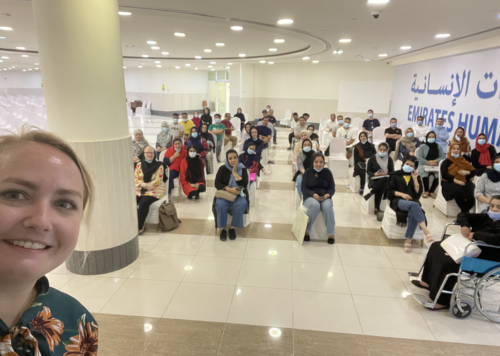ABA helps find permanent homes for Afghan evacuees stuck in Abu Dhabi, other parts of the world

Jordan Jones is a volunteer attorney who is working with the ABA’s Afghanistan Response Project to help Afghan judges, prosecutors and other rule of law professionals move from the Emirates Humanitarian City and into welcoming jurisdictions.
Following the one-year anniversary of the fall of Kabul to the Taliban on Aug. 15, the ABA Journal is highlighting the ABA’s efforts to help judges, lawyers and others from Afghanistan resettle, obtain immigration benefits and secure jobs using their legal skills. This is part three in our series.
For about eight years, Qari Abeera Ziayi lived in Herat, Afghanistan, and worked on hundreds of cases involving violence against women and children, criminal and civil issues and divorces.
Along with being a lawyer, she advocated for human rights and taught as a university professor. She also volunteered to help children with disabilities in school and underprivileged women with hand embroidery art.
“Since my childhood, I wanted to serve the society and people honestly, and I found lawyering to be a field that could connect me to my dreams,” Ziayi says. “So I chose the field of law and for a long time, I served people a lot through law.”
Because of her work, Ziayi became a target of the Taliban even before the fall of Kabul in August 2021. Members of the group threatened her and attacked her and her family several times. They threw grenades and bombs at their home. They broke windows in both their home and their car. They also beat her elderly father.
When the Taliban took over Afghanistan, Ziayi felt she had no choice but to flee.
“I was hiding in dark rooms, away from sunlight, in Kabul city for three months, and the terrorists searched a lot to find me and kill me,” she says. “They called me several times and were trying to trace me, but I changed my place of residence several times. The Taliban were looking for me everywhere.”
Ziayi left her country in October 2021, and through a foreign organization that assisted female lawyers facing danger in Afghanistan, she was brought to Emirates Humanitarian City. Managed by the United Arab Emirates government, the temporary camp housed thousands of Afghan evacuees.
That’s where Ziayi eventually met Jordan Jones, a volunteer attorney who is working with the ABA’s Afghanistan Response Project to help Afghan judges, prosecutors and other rule of law professionals move from the Emirates Humanitarian City and into welcoming jurisdictions. Jones is the director of legal affairs at the Humanitarian Legal Assistance Project in Washington, D.C.
 “Since my childhood, I wanted to serve the society and people honestly, and I found lawyering to be a field that could connect me to my dreams,” says Afghan refugee Qari Abeera Ziayi.
“Since my childhood, I wanted to serve the society and people honestly, and I found lawyering to be a field that could connect me to my dreams,” says Afghan refugee Qari Abeera Ziayi.
ABA connects Afghan evacuees stuck in Abu Dhabi to pro bono attorneys
Jones traveled to the UAE with David Dettman—the outreach and communications director for the ABA Center for Global Programs and coordinator of the Afghanistan Response Project—and other ABA staff and volunteers for the first time in March.
As part of a new initiative, they set up an intake process to screen Afghan evacuees; determine which countries would be the best fit for them; and match them with pro bono attorneys in those countries. They worked with about 250 Afghans and began evaluating their chances of moving to the United States. Their options included applying for humanitarian parole, or if they previously worked for the U.S. government, special immigrant visas.
In July, Jones took a second solo trip to the UAE and spent a week meeting with hundreds more Afghan legal professionals. Some of them were judges who put Taliban members in prison, while many others were prosecutors and lawyers who had spoken out against the group.
“These are people with such an incredible array of experience and professionalism, and they have U.S. connections,” Jones says. “They have studied in the U.S. Some of them have LLMs from the U.S. Some of them have family in the U.S.
“They risked their lives to help us put Taliban militants behind bars and ISIS militants behind bars through the legal system and build the rule of law in Afghanistan. And now they’re just sitting in EHC, where they don’t even have jobs.”
Jones sought out female judges and unaccompanied female lawyers, including Ziayi.
Ziayi had been living in Emirates Humanitarian City for more than nine months. She worried about family members who were still stuck in Afghanistan and her own future. She struggled with depression and thyroid disease, a condition that she says worsened while she was in the camp.
“It was very difficult for me to live in the Arab Emirates because my family was not with me there, nor was our fate known, how and when I would leave that camp,” says Ziayi, who decided she wanted to resettle in the United States. “I consider America a noble and advanced country, where I can get better education, better jobs, a more peaceful life and good opportunities to serve the people.”
Jones advocated for Ziayi to receive port parole, which U.S. Customs and Border Protection officials can grant to vulnerable and at-risk individuals at ports of entry. She explains that Abu Dhabi is one of 16 locations outside the United States that serves as a port of entry and the only location with a refugee camp for Afghans.
“Unlike humanitarian parole through their partner agency, [U.S. Citizenship and Immigration Services], port parole is free, and a CBP officer can grant it on their discretion after an interview,” says Jones, adding that applications for humanitarian parole have taken more than a year to adjudicate because of a backlog in cases.
CBP granted Ziayi’s request. She entered the United States in August, staying first in a refugee processing camp in Leesburg, Virginia, before being transferred to Buffalo, New York. Jones is now assisting her with her asylum application.
ABA plans to continue work with Afghan evacuees in other parts of the world
In the past year, Dettman has seen the number of Afghan evacuees who were stuck in Emirates Humanitarian City drop significantly, from about 14,000 to about 4,000.
“This is due to a wide coalition of pro bono attorneys, NGOs [nongovernmental organizations] and activists who have worked with Afghans on the ground and while advocating within many host governments to accept evacuees,” Dettman says.
Since their initial visit to Emirates Humanitarian City, Dettman estimates that Jones and other pro bono attorneys affiliated with the Afghanistan Response Project have aided about 500 evacuees in the camp. But, he says, many Afghans remain in limbo in other countries and need help with permanent placement.
“The most pressing challenge this project faces is the fact that the news cycle has moved on, while many Afghan evacuees have not,” Dettman says. “There remain tens of thousands of Afghans who still find themselves without permanent citizenship. While Afghans in EHC are finally beginning to relocate, we cannot forget about those who are still stuck in third countries or, even more pressing, those who remain in hiding in Afghanistan.”
The Afghanistan Response Project plans to use the intake process developed in Emirates Humanitarian City to help other Afghan evacuees in similar situations around the world and needs more pro bono attorneys to assist in this work. Dettman asks for their time and patience, since Afghans must navigate complex and mutable immigration systems.
Dettman adds, however, that the Afghanistan Response Project—and its three threads of work—are an amazing example of what the ABA and its members can do.
“Helping Afghans seeking refuge abroad, providing immigration assistance to those who need it here and assisting legal professionals who have settled find meaningful work, are, in my opinion, the ABA at its best,” he says. “While working on a project like this can be very frustrating, the courage and determination we see in Afghan evacuees and the selflessness from pro bono attorneys and others remains an inspiration to me.”
Ziayi hopes her family can leave Afghanistan and join her in the United States. She also hopes to return to Virginia, where the weather is warmer, and study law so she can continue her career.
“My hope for the future generation and for all the people of the world is peace, justice, progress and security,” Ziayi says. “I wish to be able to further my higher education in America, get my attorney license here again, be a member of the ABA in the near future, teach at a university and have more good goals in these fields.”
Attorneys who are interested in volunteering with the Afghanistan Response Project should contact Dettman directly at [email protected].
See also:
ABAJournal.com: “Advocates are helping Afghans apply for asylum and other immigration relief with ABA assistance”
ABAJournal.com: “ABA project aims to help Afghan legal professionals establish themselves in the United States”
Write a letter to the editor, share a story tip or update, or report an error.


